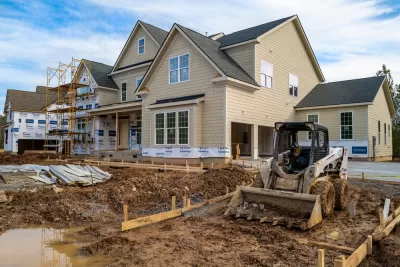Rather than providing incentives to lure employers to their cities, local leaders should focus on supporting enough affordable workforce housing to accommodate new and existing residents.

In a piece for the Philadelphia Citizen, Bruce Katz and Michael Saadine outline their ideas for “what forward-thinking localities can do to leverage housing as an economic development tool.”
The authors argue that although current market conditions should encourage developers to build new housing, “the litany of constraints on new construction across the country have made it ‘too hard’ to build new housing and ‘too easy’ to generate returns through lower-touch investments in housing.” This means investors are more likely to buy existing, fully occupied buildings rather than build new units.
“The concept of a starter home is disappearing. Our inability to build sufficient housing has made investors the most competitive buyers for much of the nation’s most affordable housing. We see yet another example of capital begetting capital in our system, with a lack of entry points for those who aspire to grow wealth from a lower baseline,” the authors write. Meanwhile, rental housing is becoming more expensive as owners profit from renovating older units and raising rents.
The article points to one example of a city that leveraged remote work to its advantage. “Tulsa, Oklahoma has a median home price that is 40 percent below that of the country overall. Though no one could have predicted the remote work wave brought on by Covid, Tulsa was forward-thinking on remote work at a time when most of us could not have imagined downtowns shuttered due to a pandemic.” In 2018, the city launched a remote work support program that drew over 1,200 new workers to the city. “While the program was not centered around housing, it paired an affordable market with an additional nudge to get ahead of what could be a massive economic wave for cities that were previously left behind.”
The article concludes, “Across the country, many metros that previously dedicated economic development resources to trying to lure employers with tax incentives would do well to think about their end consumer – residents – and how to create or maintain a housing market with enough supply to be affordable.”
FULL STORY: Affordable housing as economic development

Maui's Vacation Rental Debate Turns Ugly
Verbal attacks, misinformation campaigns and fistfights plague a high-stakes debate to convert thousands of vacation rentals into long-term housing.

Planetizen Federal Action Tracker
A weekly monitor of how Trump’s orders and actions are impacting planners and planning in America.

In Urban Planning, AI Prompting Could be the New Design Thinking
Creativity has long been key to great urban design. What if we see AI as our new creative partner?

Florida Seniors Face Rising Homelessness Risk
High housing costs are pushing more seniors, many of them on a fixed income, into homelessness.

Massachusetts Budget Helps Close MBTA Budget Gap
The budget signed by Gov. Maura Healey includes $470 million in MBTA funding for the next fiscal year.

Milwaukee Launches Vision Zero Plan
Seven years after the city signed its Complete Streets Policy, the city is doubling down on its efforts to eliminate traffic deaths.
Urban Design for Planners 1: Software Tools
This six-course series explores essential urban design concepts using open source software and equips planners with the tools they need to participate fully in the urban design process.
Planning for Universal Design
Learn the tools for implementing Universal Design in planning regulations.
Gallatin County Department of Planning & Community Development
Heyer Gruel & Associates PA
JM Goldson LLC
City of Camden Redevelopment Agency
City of Astoria
Transportation Research & Education Center (TREC) at Portland State University
Jefferson Parish Government
Camden Redevelopment Agency
City of Claremont





























